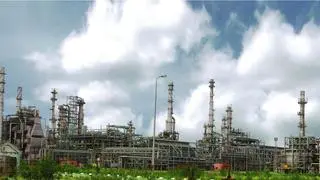Two-and-a-half weeks ago Maruti Suzuki's Manesar production facility fell victim to one of the worst cases of industrial violence in recent times. That violent episode is now a subject of intense investigation.
Questioning of the union leaders who caused the mayhem is now expected to speed up the investigation by the special team set up by the Haryana Government.
For Maruti, its plans to restart the facility now hinges on the arrest of all the other accomplices involved and improving security at Manesar.
Manpower crunch
Even if this happens, analysts say that restarting the facility will prove to be a “tricky” task. Manning the facility fully will be the first challenge.
The clash has created fear within the management, and with many uneasy to return, the company could be faced with people exiting as well.
With hundreds of workers expected to be suspended, finding a new skilled workforce will not be easy.
Even if it shifts a few workers from Gurgaon and asks suppliers to pitch in with workers for non-production roles, there will still be a manpower crunch, they say.
Passenger car sales
For Maruti, this shutdown comes at a time when the passenger car sales seem to be recovering after the slowdown of 2011-12.
As against a modest 4.5 per cent rise in volumes last year, passenger car volumes have grown by 9.7 per cent in the first quarter of 2012-13. July car sales too have been encouraging.
But, for now Maruti will not be able to take advantage of the reviving demand.
Deepesh Rathore, Managing Director at IHS Auto India, says that if production halts at Manesar for any longer, the hit may be harder.
“We expect them to gain back the lost market share in a few months. I don’t think customers will shift in large numbers, many would chose to wait.”
Double whammy
That the shutdown occurred at Manesar is a double whammy. Manesar produces the Swift, Dzire and SX4, all of which are available in diesel versions too.
In the last one year, with the gap between petrol and diesel prices widening, diesel cars and utility vehicles have been the driving force for car makers.
In the models in which the diesel version is available, they make up over 75 per cent of vehicles sold.
Overall, diesel vehicles (Swift, Dzire, SX4 and Ritz) contribute 20-25 per cent of the total vehicles sold for the company.
With the budget holding off widely expected taxes on diesel vehicles, diesel car sales have received a further fillip.
But the shutdown effectively prevents Maruti from taking advantage of this window of opportunity.
This shutdown has financial implications too. First, the plant has a capacity to produce 1,900 units a day.
Lacklustre results
According to the company, a month’s shutdown will result in a revenue loss of about Rs 2,700 crore.
The company has already had a lacklustre first quarter. Net sales increased by 27.5 per cent to Rs 10,529 crore, helped by improved volumes and higher realisations from diesel vehicles.
But net profits plunged by 23 per cent to Rs 243 crore – the reason being lower margins from currency fluctuations in the payment of royalty and in payments to vendors and higher interest costs due to ongoing expansions.
The second quarter performance could be worse. The cushion from volumes and realisations will not be available because of the shut down.
Operating margins, at 7.3 per cent currently, would take a further hit.
More so, if currency fluctuations (rupee vs yen) continue to haunt it, or if the company decides to offer discounts to boost festival season sales.
Also, even after the plant commences operations, the wait period for models such as Swift or Dzire would be further extended.
With the festival season fast approaching, people may not be willing to wait for extended periods.
This could result in market share losses even after normal operations commence.
Finally, the company has already had shutdowns on and off from June to October 2011, indicating that labour troubles have been brewing for more than a year now.
So, instead of ad-hoc solutions, the company will now be forced to arrive at a more permanent solution to smoothen labour– management relations.
This could result in higher employee costs.
Financial implications
The month-long shutdown will also impact Maruti's financial performance in the second quarter as well as third quarter of this fiscal.
In all, it is estimated to lose at least Rs 2,700 crore in revenue on a loss of production of about 47,500 units.
Re-starting operations is critical as the diesel models of Swift and Dzire face waiting period of up to six months and the festival season demand is right round the corner – bookings begin by end-August.
Competitors may gain
Any delay would help rivals make strong gains.
The carmaker, which sells two out of every five cars sold in India, is also likely to lose market share by two per cent if production stops for 4-5 weeks, though this will be a temporary blip, say analysts.
Trends in market share will depend on how quickly other carmakers ramp up diesel vehicle output, which may not be easy.
Labour issues have been plaguing the company for the last two years now.
However, Maruti’s waning dominance in the domestic car market over the last few years was primarily attributed to other factors such as unavailability of models in fast-growing segments such as compact SUVs.
Market share
Due to these reasons, the company’s market share has slid from 50 per cent in 2009 to 47 per cent in June, 2010 and 40 per cent today.
With increased competition and multiple models coming in every quarter, both analysts and company officials say that the market share may now stabilise, provided Maruti is able to produce the models that are in demand.
(With inputs from Parvatha Vardhini C)








Comments
Comments have to be in English, and in full sentences. They cannot be abusive or personal. Please abide by our community guidelines for posting your comments.
We have migrated to a new commenting platform. If you are already a registered user of TheHindu Businessline and logged in, you may continue to engage with our articles. If you do not have an account please register and login to post comments. Users can access their older comments by logging into their accounts on Vuukle.